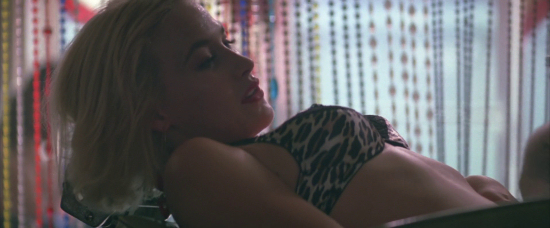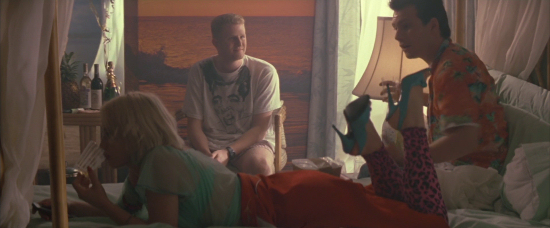
It was a girl, my friend Trisa, who introduced me to 1993's True Romance around twelve years ago, and yet it seems rather like a male fantasy--to be sure, a very nice one. Like Christian Slater's character Clarence, I'm a guy obsessed with movies and would happily sit through a Sonny Chiba marathon. I would never dream a flawlessly beautiful woman would walk in, spill popcorn on me, and almost instantly fall completely in love with me. I would certainly fantasise about it--except I hate popcorn--but I wouldn't dare write it expecting an audience to buy it. Quentin Tarantino, it seems, has better vision. He wrote the screenplay for this wonderful film directed by the late Tony Scott.

Tony Scott's style always struck me as a less distinct version of his brother Ridley's. He was unquestionably a more mainstream director with films like Top Gun and Crimson Tide in his filmography. As such there's usually less in his movies that would challenge the regular movie-goer--he shared Ridley's love for high contrast lighting with lots of darks diffused by smoke or mist. But you didn't see things like Ridley's love for condensation and beads, or strange and effective shifts between close-ups and long shots that helped convey the feelings of the characters. But I wouldn't say I think anyone could've done a better job with True Romance than Tony Scott. His plain but smart style perfectly delivers Tarantino's screenplay. It's to his credit he didn't decide to swap out Sonny Chiba with Bruce Lee or something else in an attempt to make the reference more mainstream. The movie's filled with movie references, in fact, that one suspects could only have come from the consummate cinephile Tarantino.

Between Lost Highway and True Romance, Patricia Arquette is the incredibly, perfectly desirable woman. In both movies, the character she's playing is essentially meant to be that, yes--but there aren't many actresses who could pull that off quite as well as her, not even a more beautiful actress. She reminds me of Kim Novak in Vertigo--their bodies are similar but more importantly they both have that enigmatic, oddly frail voice. It creates an impression of vulnerability which is attractive but because it's simply her natural speaking voice one can't trust that impression of frailty--nor wholly disregard it. This creates a compelling mystery while also lending the actress an ethereal quality in exciting contrast to her curvaceous body.
Arquette's character in True Romance, Alabama, is clearly an Elvis woman, as Uma Thurman's character in Pulp Fiction might have said.

Her style is southern rockabilly trashy which is nice for those of us who find that sort of thing appealing but is made doubly so by that voice of hers.
And of course this is another thing that makes her an improbably perfect match for Clarence, who tells a woman at the beginning of the film that despite not being gay he would happily fuck Elvis.

Neither Clarence nor Alabama is free of common, lower class bigotry, which is a typical Tarantino touch. Despite all the big things that happen in his movies, he never writes movies about paragons, his characters always seem to be reflective of a social group or milieu, which is an effect of Tarantino's philosophy of not imposing his own moral outlook on his characters. This of course facilitates one of the most famous scenes in the movie, where Christopher Walken as a mafia Don interrogates Clarence's father, played by the late Dennis Hopper.

Tarantino and Scott avoid inserting some "I'm not a racist," cue. They trust the audience to know the point of Hopper telling Walken his great grandmother had sex "with a nigger" is that Hopper knows how much it would offend Walken. And maybe Hopper's character is racist, too--he's a former police officer living in poverty in Detroit, it's not outside the realm of probability. The great thing about the scene is the sense that, between these two men, all notions of discretion and decency are completely out the window. Walken is unquestionably going to beat Hopper to death, and Hopper is unquestionably not going to crack--and the way he demonstrates this shows not only his resolve but also his complete departure from civil consideration.

And the film's other famous interrogation sequence, between the late James Gandolfini and Patricia Arquette, is no less impressive. Gandolfini has something like seventh or eighth billing but this scene by itself has has far more to it than Brad Pitt's entertaining pot head or Gary Oldman's complex and threatening poseur pimp.
Like Hopper, Arquette is absolutely firm in her conviction not to give up information. But she's a little smarter, she's cool as a cucumber when she tries to bluff Gandolfini at the beginning and if Gandolfini hadn't already had good information that she was the girl he was looking for one thinks she may have gotten away. But she doesn't and he proceeds to beat the shit out of her.

But this is hardly the typical scene of a man beating a woman--even of a mobster beating a woman. He makes no attempt to sexually assault her, there seems to be a mutual understanding between them, even a respect--on top of which there's a psychological battle going on that's almost separate from the physical beating. The beating is almost a formality, they both seem to acknowledge this is what has to happen.
His real ploy is when he sits down and tells her what it's like to kill people, how his first time was hard, the second time wasn't quite as hard, and now he does it just to see a person's expression change. He's letting her know how far he can go, but like a good actor knows he needs to have real feeling in his performance, one senses he's telling her the truth; this is what killing is like for him. And from how impersonal the beating is, and how disconnected it seems to be from his level of respect for her we can infer it's the truth.
Tarantino seems fond of the interrogation scene as a platform for a psychological discourse and character development--even one sided interrogations like the ones in Reservoir Dogs, and Pulp Fiction. Christoph Waltz spends almost all his screen time in Inglorious Basterds conducting interrogations.

Clarence is an oddly passive character for most of the movie, but that's fine. He actually doesn't really need to do anything after he goes after Alabama's pimp--that piece of the story starts out with the viewer thinking, damn, this kid's about to do something incredibly, pointlessly stupid and somehow this makes it all the funnier and sweeter when he succeeds. It's the essence of why you pull for Clarence and Alabama--their "true romance" is sort of stupid but oddly perfect and completely wonderful. They're both characters of simple, unshakeable resolve.

No comments:
Post a Comment